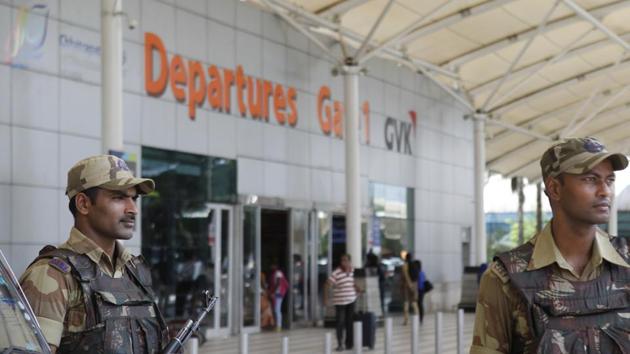Airport set to get full-body scanners for detecting non-metallic explosives
“Once we receive the scanner we will commence a trial run, after which we will commence the use of these scanners,” said the spokesperson. Each body scanner costs around Rs1 crore.
Passengers at Mumbai’s Chhatrapati Shivaji Maharaj International Airport (CSMIA) may soon go through a full body scan as part of mandatory security procedures after checking in.

A spokesperson for Mumbai International Airport Pvt. Ltd. (MIAL) told HT on Thursday that it has invited bids to supply one device to conduct a trial run. Manufacturers of body scanners are to submit their expressions of interest within seven days.
“Once we receive the scanner we will commence a trial run, after which we will commence the use of these scanners,” said the spokesperson. Each body scanner costs around Rs1 crore.
On April 24, the Bureau of Civil Aviation Security (BCAS) had issued a circular announcing its decision to install scanners that will identify non-metallic as well as any concealed metallic weapons and explosives.
It mentioned that walk-through metal detectors and hand-held metal detectors cannot detect non-metallic explosives. Body scanners are currently used in a number of major airports in the United States of America.
An official from Central Industrial Security Force (CISF) said, “Use of body scanners will save time. The passengers will have to simply walk through the scanner after removing thick clothing, belts, jackets, shoes which will be scanned by the present x- ray machines.”
The CISF handles security at all major airports in the country.
A senior official of Airports Authority of India (AAI) said, “Each scanner will capture images of a passenger from all angles. In case of a potential threat, the item will be presented graphically and will then be taken up by security personnel.”
A security official said, “These scanners will be able to identify standard and homemade explosives, improvised explosives devices and liquids, gels or any other items hidden under clothes and over the skin.” One scanner is expected to handle 300 passengers per hour at CSMIA.
In 2010, a trial run with a body scanner in the domestic terminal in Delhi’s Indira Gandhi International Airport was abandoned after concerns regarding privacy and potentially harmful side effects of radiation were raised.
The CISF official said the BCAS has addressed these concerns so that the radiation emitted by the scanners is reduced. In a circular from 2018, the BCAS said airport operators should ensure the manufacturer of body scanners provide a model specific certificate from either national or international accreditation laboratories.
Stay updated with all the Breaking News and Latest News from Mumbai. Click here for comprehensive coverage of top Cities including Bengaluru, Delhi, Hyderabad, and more across India along with Stay informed on the latest happenings in World News.
Stay updated with all the Breaking News and Latest News from Mumbai. Click here for comprehensive coverage of top Cities including Bengaluru, Delhi, Hyderabad, and more across India along with Stay informed on the latest happenings in World News.






